Gairdner J. History of the Life and Reign of Richard the Third: To which is Added the Story of Perkin Warbeck from Original Documents
Подождите немного. Документ загружается.

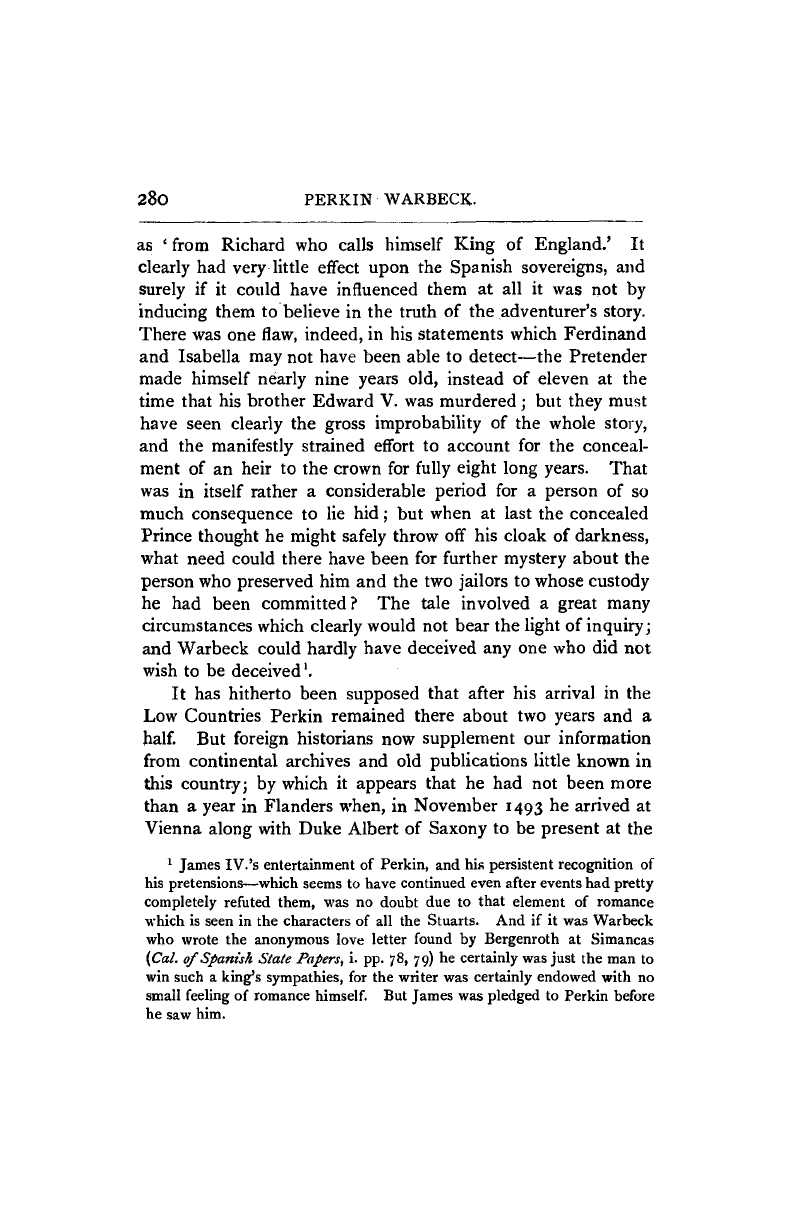
PERKIN WARBECK.
as ' from Richard who calls himself King of England.' It
clearly had very little effect upon the Spanish sovereigns, and
surely if it could have influenced them at all it was not by
inducing them to believe in the truth of the adventurer's story.
There was one flaw, indeed, in his statements which Ferdinand
and Isabella may not have been able to detect—the Pretender
made himself nearly nine years old, instead of eleven at the
time that his brother Edward V. was murdered; but they must
have seen clearly the gross improbability of the whole story,
and the manifestly strained effort to account for the conceal-
ment of an heir to the crown for fully eight long years. That
was in itself rather a considerable period for a person of so
much consequence to lie hid; but when at last the concealed
Prince thought he might safely throw off his cloak of darkness,
what need could there have been for further mystery about the
person who preserved him and the two jailors to whose custody
he had been committed? The tale involved a great many
circumstances which clearly would not bear the light of inquiry;
and Warbeck could hardly have deceived any one who did not
wish to be deceived'.
It has hitherto been supposed that after his arrival in the
Low Countries Perkin remained there about two years and a
half.
But foreign historians now supplement our information
from continental archives and old publications little known in
this country; by which it appears that he had not been more
than a year in Flanders when, in November 1493 he arrived at
Vienna along with Duke Albert of Saxony to be present at the
1
James IV.'s entertainment of Perkin, and his persistent recognition of
his pretensions—which seems to have continued even after events had pretty
completely refuted them, was no doubt due to that element of romance
which is seen in the characters of all the Stuarts. And if it was Warbeck
who wrote the anonymous love letter found by Bergenroth at Simancas
(Cal. of Spanish State Papers, i. pp. 78, 79) he certainly was just the man to
win such a king's sympathies, for the writer was certainly endowed with no
small feeling of romance
himself.
But James was pledged to Perkin before
he saw him.
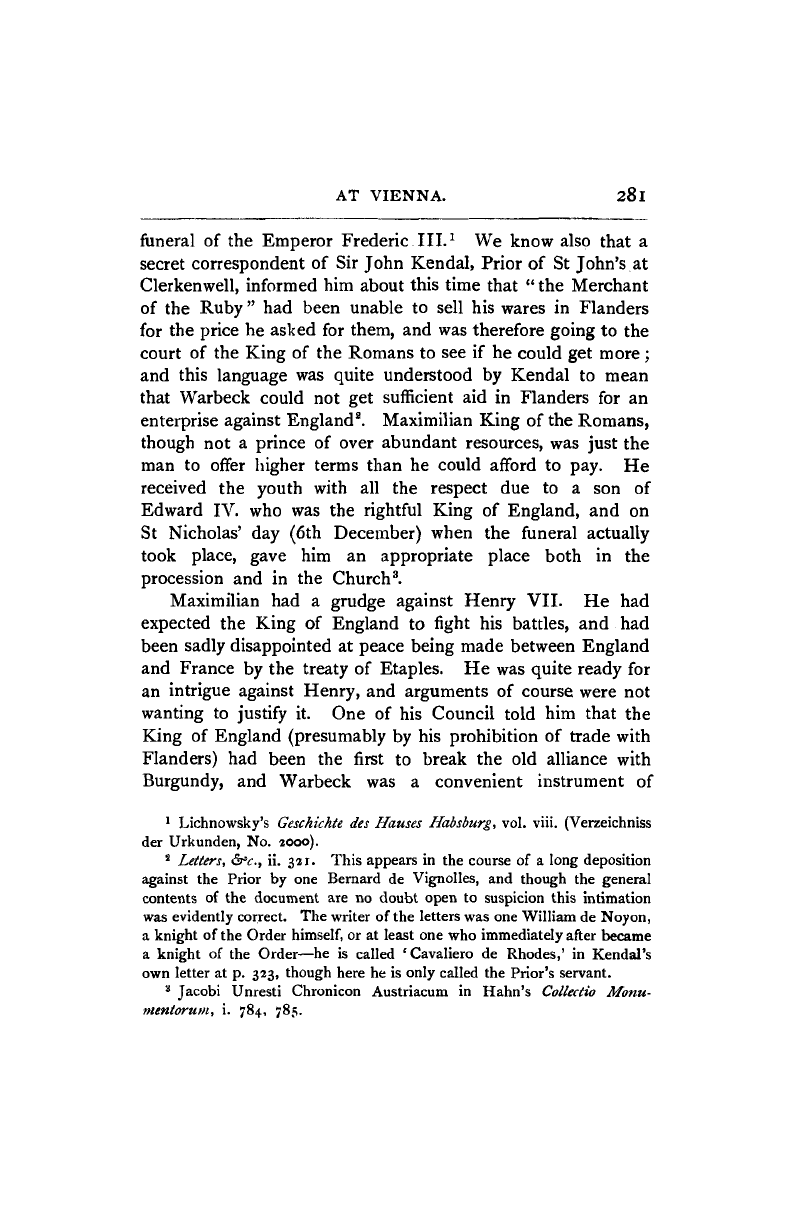
AT VIENNA. 28l
funeral of the Emperor Frederic III.
1
We know also that a
secret correspondent of Sir John Kendal, Prior of St John's at
Clerkenwell, informed him about this time that " the Merchant
of the Ruby" had been unable to sell his wares in Flanders
for the price he asked for them, and was therefore going to the
court of the King of the Romans to see if he could get more;
and this language was quite understood by Kendal to mean
that Warbeck could not get sufficient aid in Flanders for an
enterprise against England
2
. Maximilian King of the Romans,
though not a prince of over abundant resources, was just the
man to offer higher terms than he could afford to pay. He
received the youth with all the respect due to a son of
Edward IV. who was the rightful King of England, and on
St Nicholas' day (6th December) when the funeral actually
took place, gave him an appropriate place both in the
procession and in the Church
3
.
Maximilian had a grudge against Henry VII. He had
expected the King of England to fight his battles, and had
been sadly disappointed at peace being made between England
and France by the treaty of Etaples. He was quite ready for
an intrigue against Henry, and arguments of course were not
wanting to justify it. One of his Council told him that the
King of England (presumably by his prohibition of trade with
Flanders) had been the first to break the old alliance with
Burgundy, and Warbeck was a convenient instrument of
1
Lichnowsky's
Geschichte
des Hauses Habsburg, vol. viii. (Verzeichniss
der Urkunden, No. 2000).
a
Letters, &*c, ii. 321. This appears in the course of a long deposition
against the Prior by one Bernard de Vignolles, and though the general
contents of the document are no doubt open to suspicion this intimation
was evidently correct. The writer of the letters was one William de Noyon,
a knight of the Order
himself,
or at least one who immediately after became
a knight of the Order—he is called 'Cavaliero de Rhodes,' in Kendal's
own letter at p. 323, though here he is only called the Prior's servant.
3
Jacobi Unresti Chronicon Austriacum in Hahn's Collectio Monu-
mentorum, i. 784, 78?.
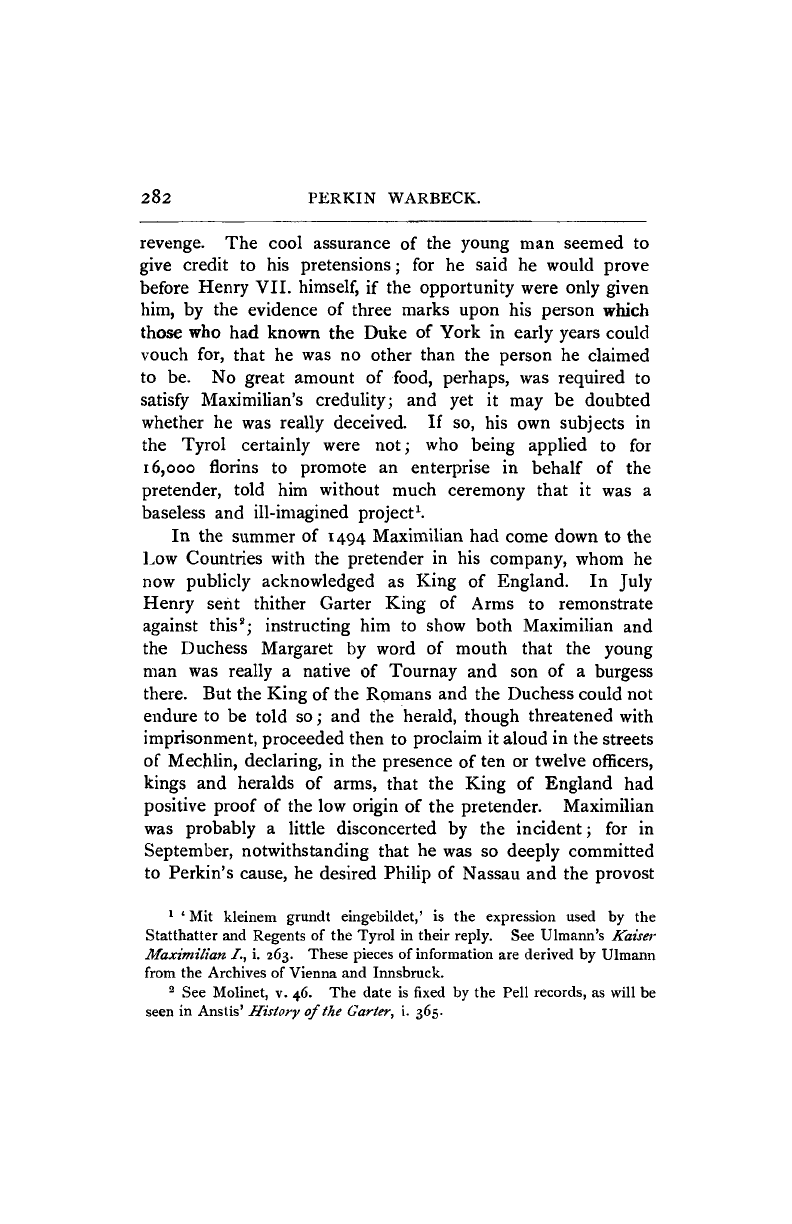
282 PERKIN WARBECK.
revenge. The cool assurance of the young man seemed to
give credit to his pretensions; for he said he would prove
before Henry VII.
himself,
if the opportunity were only given
him, by the evidence of three marks upon his person which
those who had known the Duke of York in early years could
vouch for, that he was no other than the person he claimed
to be. No great amount of food, perhaps, was required to
satisfy Maximilian's credulity; and yet it may be doubted
whether he was really deceived. If so, his own subjects in
the Tyrol certainly were not; who being applied to for
16,000 florins to promote an enterprise in behalf of the
pretender, told him without much ceremony that it was a
baseless and ill-imagined project
1
.
In the summer of 1494 Maximilian had come down to the
Low Countries with the pretender in his company, whom he
now publicly acknowledged as King of England. In July
Henry sent thither Garter King of Arms to remonstrate
against this
2
; instructing him to show both Maximilian and
the Duchess Margaret by word of mouth that the young
man was really a native of Tournay and son of a burgess
there. But the King of the Romans and the Duchess could not
endure to be told so; and the herald, though threatened with
imprisonment, proceeded then to proclaim it aloud in the streets
of Mechlin, declaring, in the presence of ten or twelve officers,
kings and heralds of arms, that the King of England had
positive proof of the low origin of the pretender. Maximilian
was probably a little disconcerted by the incident; for in
September, notwithstanding that he was so deeply committed
to Perkin's cause, he desired Philip of Nassau and the provost
1
' Mit kleinem grundt eingebildet,' is the expression used by the
Statthatter and Regents of the Tyrol in their reply. See Ulmann's Kaiser
Maximilian I., i. 263. These pieces of information are derived by Ulmann
from the Archives of Vienna and Innsbruck.
2
See Molinet, v. 46. The date is fixed by the Pell records, as will be
seen in Anstis' History of the Garter, i. 365.
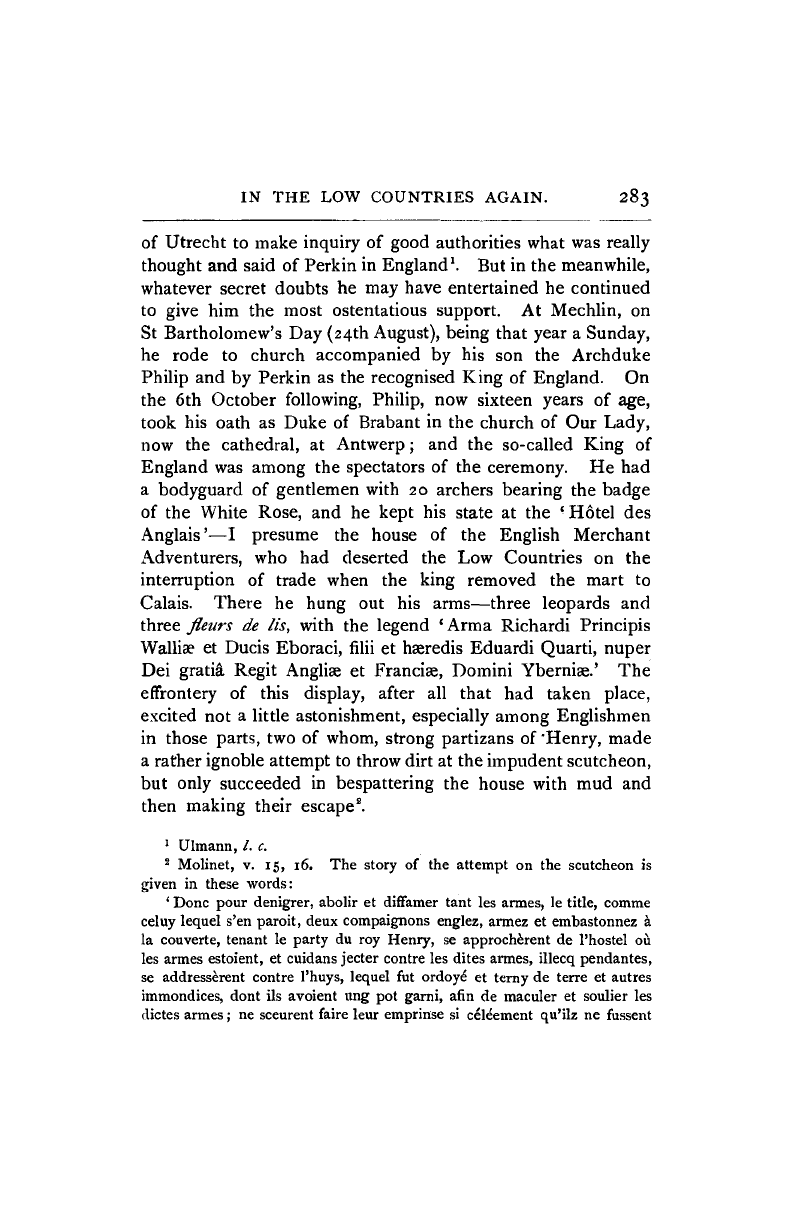
IN THE LOW COUNTRIES AGAIN. 283
of Utrecht to make inquiry of good authorities what was really
thought and said of Perkin in England
1
. But in the meanwhile,
whatever secret doubts he may have entertained he continued
to give him the most ostentatious support. At Mechlin, on
St Bartholomew's Day (24th August), being that year a Sunday,
he rode to church accompanied by his son the Archduke
Philip and by Perkin as the recognised King of England. On
the 6th October following, Philip, now sixteen years of age,
took his oath as Duke of Brabant in the church of Our Lady,
now the cathedral, at Antwerp; and the so-called King of
England was among the spectators of the ceremony. He had
a bodyguard of gentlemen with 20 archers bearing the badge
of the White Rose, and he kept his state at the ' Hotel des
Anglais'—I presume the house of the English Merchant
Adventurers, who had deserted the Low Countries on the
interruption of trade when the king removed the mart to
Calais. There he hung out his arms—three leopards and
three fleurs de Us, with the legend ' Arma Richardi Principis
Walliae et Ducis Eboraci, filii et haeredis Eduardi Quarti, nuper
Dei gratia Regit Anglise et Francise, Domini Ybernias.' The
effrontery of this display, after all that had taken place,
excited not a little astonishment, especially among Englishmen
in those parts, two of whom, strong partizans of 'Henry, made
a rather ignoble attempt to throw dirt at the impudent scutcheon,
but only succeeded in bespattering the house with mud and
then making their escape
2
.
1
Ulmann, /. c.
2
Molinet, v. 15, 16. The story of the attempt on the scutcheon is
given in these words:
' Done pour denigrer, abolir et diffamer tant les armes, le title, comme
celuy lequel s'en paroit, deux compaignons englez, armez et embastonnez a
la couverte, tenant le party du roy Henry, se approcherent de l'hostel ou
les armes estoient, et cuidans jecter contre les dites armes, illecq pendantes,
se addresserent contre l'huys, lequel fat ordoye et terny de terre et autres
immondices, dont ils avoient ung pot garni, afin de maculer et soulier les
dictes armes; ne sceurent faire leur emprinse si celeement qu'ilz ne fussent
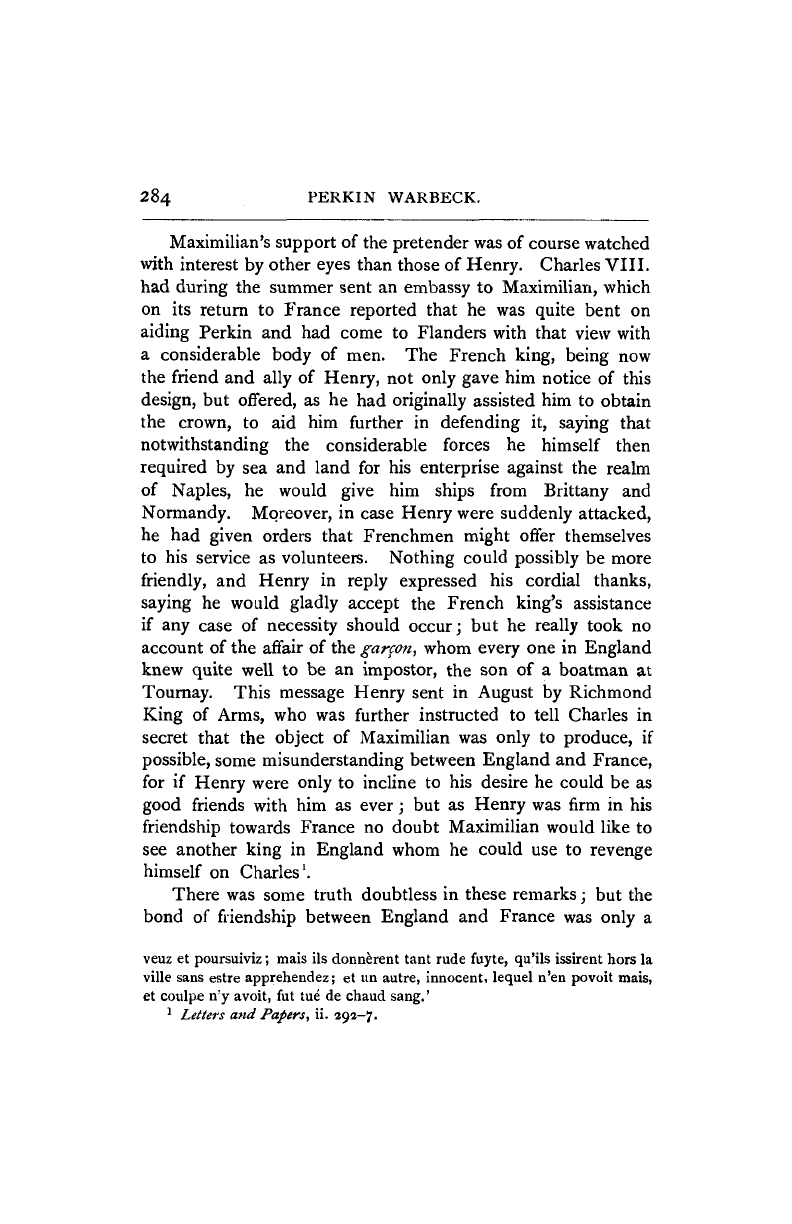
284 PERKIN WARBECK.
Maximilian's support of the pretender was of course watched
with interest by other eyes than those of Henry. Charles VIII.
had during the summer sent an embassy to Maximilian, which
on its return to France reported that he was quite bent on
aiding Perkin and had come to Flanders with that view with
a considerable body of men. The French king, being now
the friend and ally of Henry, not only gave him notice of this
design, but offered, as he had originally assisted him to obtain
the crown, to aid him further in defending it, saying that
notwithstanding the considerable forces he himself then
required by sea and land for his enterprise against the realm
of Naples, he would give him ships from Brittany and
Normandy. Moreover, in case Henry were suddenly attacked,
he had given orders that Frenchmen might offer themselves
to his service as volunteers. Nothing could possibly be more
friendly, and Henry in reply expressed his cordial thanks,
saying he would gladly accept the French king's assistance
if any case of necessity should occur; but he really took no
account of the affair of the garfon, whom every one in England
knew quite well to be an impostor, the son of a boatman at
Tournay. This message Henry sent in August by Richmond
King of Arms, who was further instructed to tell Charles in
secret that the object of Maximilian was only to produce, if
possible, some misunderstanding between England and France,
for if Henry were only to incline to his desire he could be as
good friends with him as ever; but as Henry was firm in his
friendship towards France no doubt Maximilian would like to
see another king in England whom he could use to revenge
himself on Charles
1
.
There was some truth doubtless in these remarks; but the
bond of friendship between England and France was only a
veuz et poursuiviz; mais ils donnerent tant rude fuyte, qu'ils issirent hors la
ville sans estre apprehendez; et un autre, innocent, lequel n'en povoit mais,
et coulpe n'y avoit, fut tue de chaud sang.'
1
Letters and Papers, ii. 292-7.
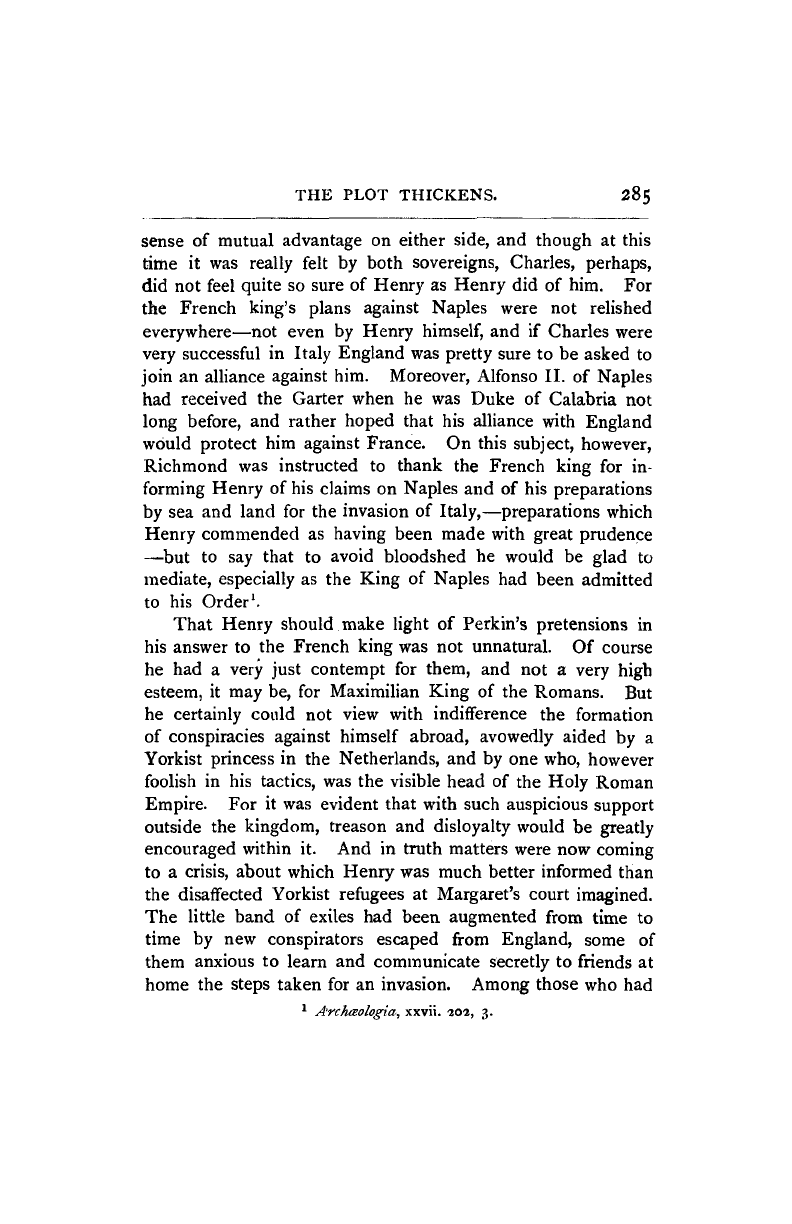
THE PLOT THICKENS. 285
sense of mutual advantage on either side, and though at this
time it was really felt by both sovereigns, Charles, perhaps,
did not feel quite so sure of Henry as Henry did of him. For
the French king's plans against Naples were not relished
everywhere—not even by Henry
himself,
and if Charles were
very successful in Italy England was pretty sure to be asked to
join an alliance against him. Moreover, Alfonso II. of Naples
had received the Garter when he was Duke of Calabria not
long before, and rather hoped that his alliance with England
would protect him against France. On this subject, however,
Richmond was instructed to thank the French king for in-
forming Henry of his claims on Naples and of his preparations
by sea and land for the invasion of Italy,—preparations which
Henry commended as having been made with great prudence
—but to say that to avoid bloodshed he would be glad to
mediate, especially as the King of Naples had been admitted
to his Order
1
.
That Henry should make light of Perkin's pretensions in
his answer to the French king was not unnatural. Of course
he had a very just contempt for them, and not a very high
esteem, it may be, for Maximilian King of the Romans. But
he certainly could not view with indifference the formation
of conspiracies against himself abroad, avowedly aided by a
Yorkist princess in the Netherlands, and by one who, however
foolish in his tactics, was the visible head of the Holy Roman
Empire. For it was evident that with such auspicious support
outside the kingdom, treason and disloyalty would be greatly
encouraged within it. And in truth matters were now coming
to a crisis, about which Henry was much better informed than
the disaffected Yorkist refugees at Margaret's court imagined.
The little band of exiles had been augmented from time to
time by new conspirators escaped from England, some of
them anxious to learn and communicate secretly to friends at
home the steps taken for an invasion. Among those who had
1
Arctuzologia, xxvii. 202, 3.
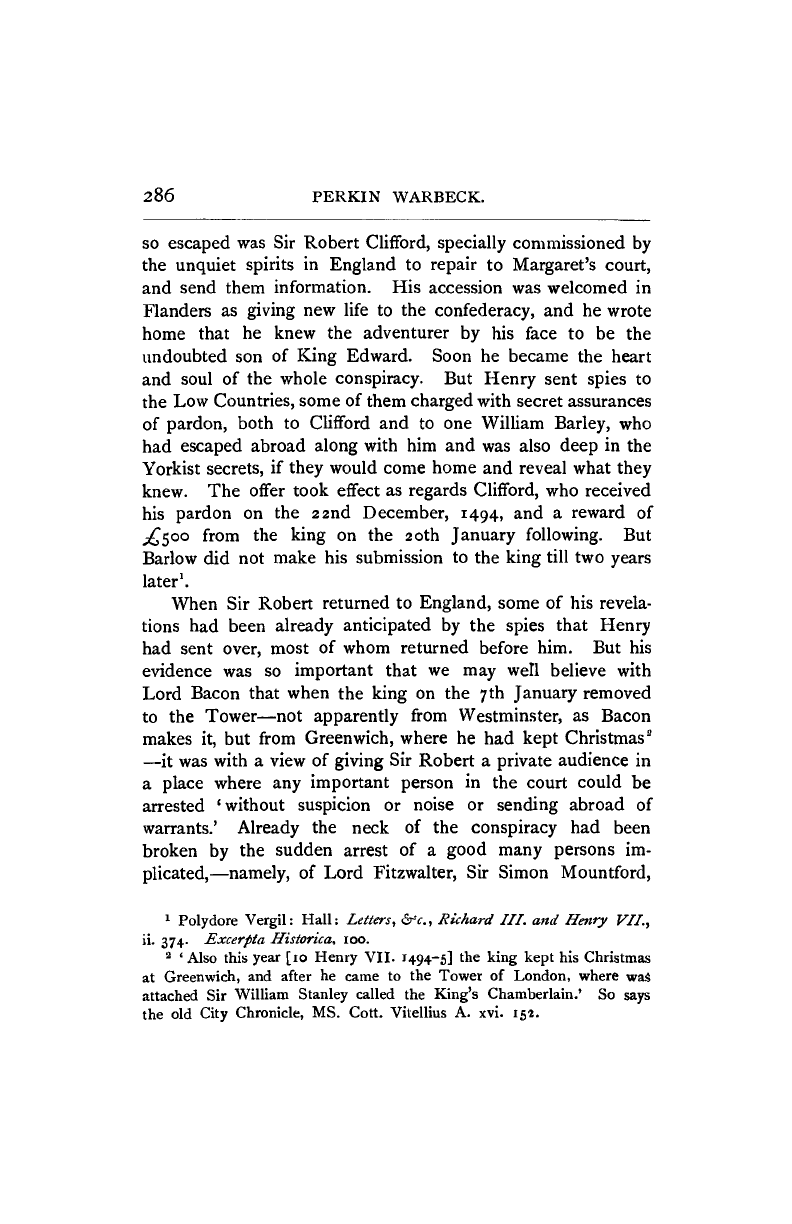
286 PERKIN WARBECK.
so escaped was Sir Robert Clifford, specially commissioned by
the unquiet spirits in England to repair to Margaret's court,
and send them information. His accession was welcomed in
Flanders as giving new life to the confederacy, and he wrote
home that he knew the adventurer by his face to be the
undoubted son of King Edward. Soon he became the heart
and soul of the whole conspiracy. But Henry sent spies to
the Low Countries, some of them charged with secret assurances
of pardon, both to Clifford and to one William Barley, who
had escaped abroad along with him and was also deep in the
Yorkist secrets, if they would come home and reveal what they
knew. The offer took effect as regards Clifford, who received
his pardon on the 22nd December, 1494, and a reward of
^500 from the king on the 20th January following. But
Barlow did not make his submission to the king till two years
later
1
.
When Sir Robert returned to England, some of his revela-
tions had been already anticipated by the spies that Henry
had sent over, most of whom returned before him. But his
evidence was so important that we may well believe with
Lord Bacon that when the king on the 7th January removed
to the Tower—not apparently from Westminster, as Bacon
makes it, but from Greenwich, where he had kept Christmas
2
—it was with a view of giving Sir Robert a private audience in
a place where any important person in the court could be
arrested 'without suspicion or noise or sending abroad of
warrants.' Already the neck of the conspiracy had been
broken by the sudden arrest of a good many persons im-
plicated,—namely, of Lord Fitzwalter, Sir Simon Mountford,
1
Polydore Vergil: Hall: Letters, &c, Richard III. and Henry VII.,
ii.
374. Excerpta Historica, 100.
2
' Also this year [10 Henry VII. 1494-5] the king kept his Christmas
at Greenwich, and after he came to the Tower of London, where was
attached Sir William Stanley called the King's Chamberlain.' So says
the old City Chronicle, MS. Cott. Vitellius A. xvi. 152.
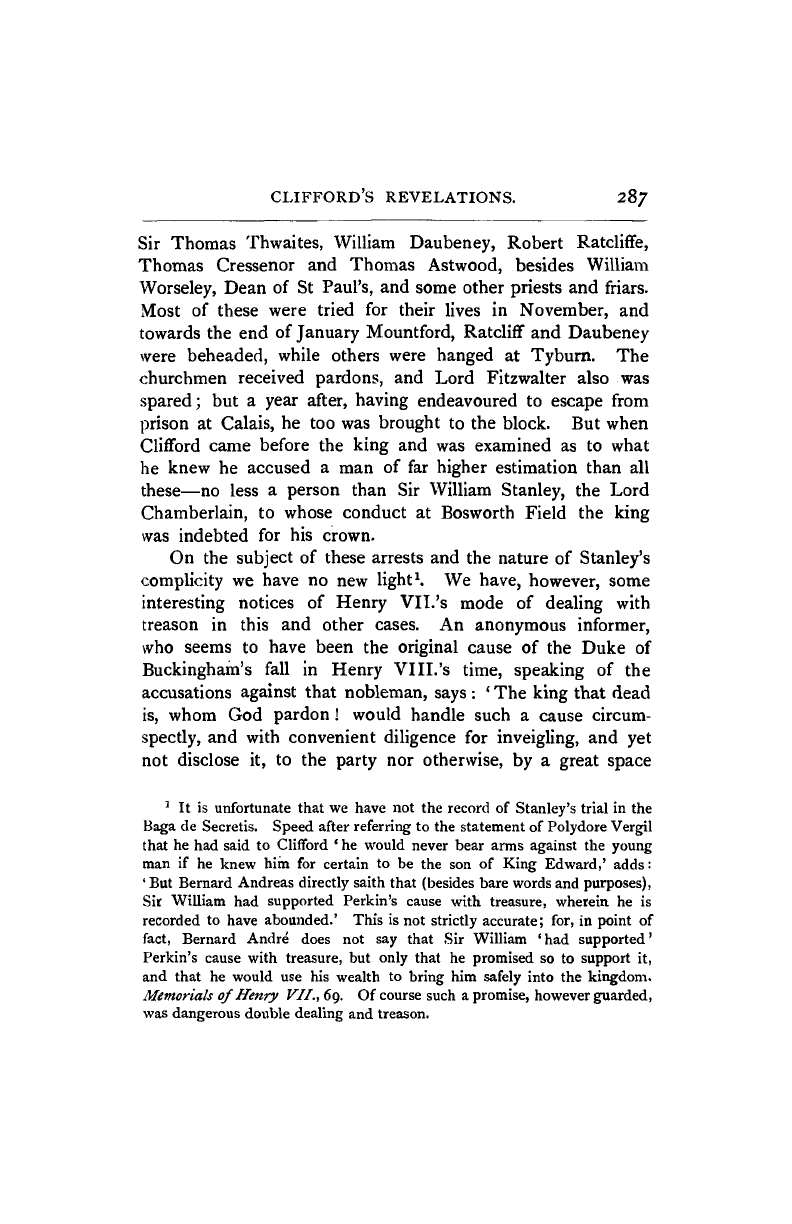
CLIFFORD'S REVELATIONS. 287
Sir Thomas Thwaites, William Daubeney, Robert Ratcliffe,
Thomas Cressenor and Thomas Astwood, besides William
Worseley, Dean of St Paul's, and some other priests and friars.
Most of these were tried for their lives in November, and
towards the end of January Mountford, Ratcliff and Daubeney
were beheaded, while others were hanged at Tyburn. The
churchmen received pardons, and Lord Fitzwalter also was
spared; but a year after, having endeavoured to escape from
prison at Calais, he too was brought to the block. But when
Clifford came before the king and was examined as to what
he knew he accused a man of far higher estimation than all
these—no less a person than Sir William Stanley, the Lord
Chamberlain, to whose conduct at Bosworth Field the king
was indebted for his crown.
On the subject of these arrests and the nature of Stanley's
complicity we have no new light
1
. We have, however, some
interesting notices of Henry VII.'s mode of dealing with
treason in this and other cases. An anonymous informer,
who seems to have been the original cause of the Duke of
Buckingham's fall in Henry VIII.'s time, speaking of the
accusations against that nobleman, says
:
' The king that dead
is,
whom God pardon! would handle such a cause circum-
spectly, and with convenient diligence for inveigling, and yet
not disclose it, to the party nor otherwise, by a great space
1
It is unfortunate that we have not the record of Stanley's trial in the
Baga de Secretis. Speed after referring to the statement of Polydore Vergil
that he had said to Clifford ' he would never bear arms against the young
man if he knew him for certain to be the son of King Edward,' adds:
' But Bernard Andreas directly saith that (besides bare words and purposes),
Sit William had supported Perkin's cause with treasure, wherein he is
recorded to have abounded.' This is not strictly accurate; for, in point of
fact, Bernard Andre does not say that Sir William 'had supported'
Perkin's cause with treasure, but only that he promised so to support it,
and that he would use his wealth to bring him safely into the kingdom.
Memorials of Henry VII., 69. Of course such a promise, however guarded,
was dangerous double dealing and treason.
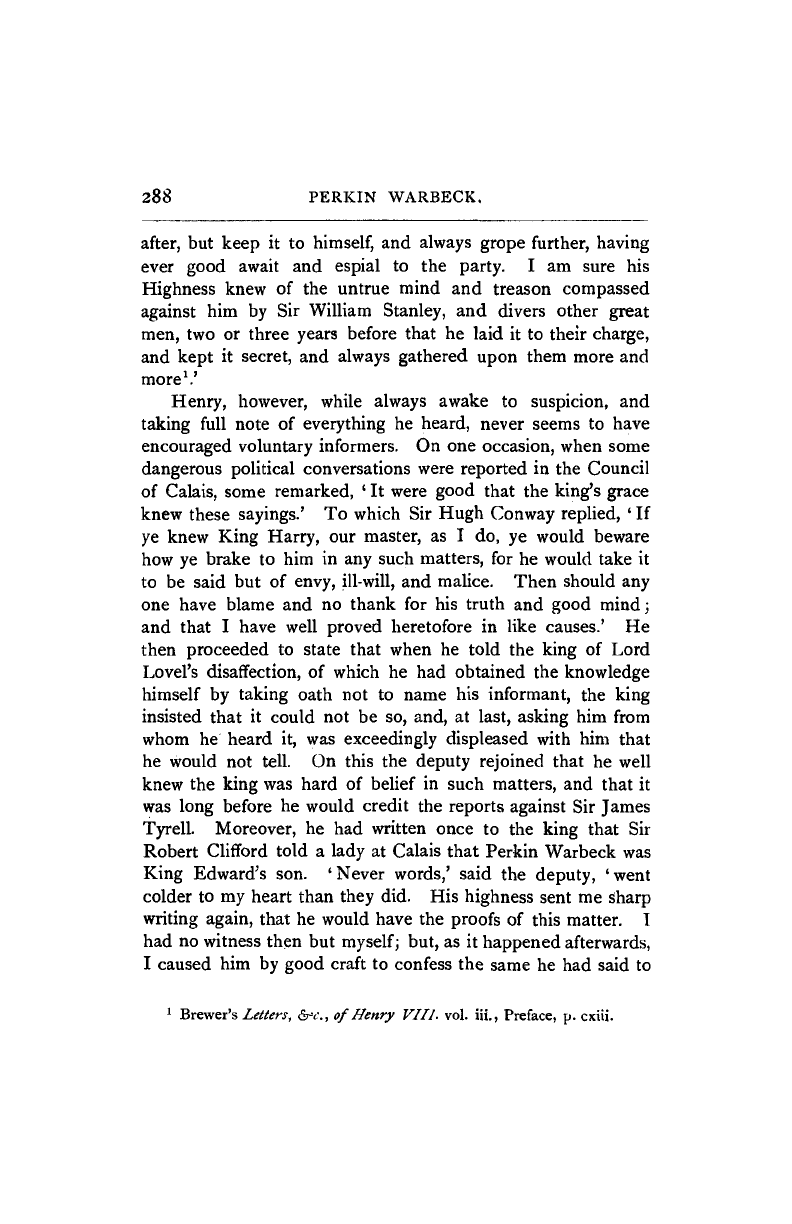
288 PERKIN WARBECK.
after, but keep it to
himself,
and always grope further, having
ever good await and espial to the party. I am sure his
Highness knew of the untrue mind and treason compassed
against him by Sir William Stanley, and divers other great
men, two or three years before that he laid it to their charge,
and kept it secret, and always gathered upon them more and
more
1
.'
Henry, however, while always awake to suspicion, and
taking full note of everything he heard, never seems to have
encouraged voluntary informers. On one occasion, when some
dangerous political conversations were reported in the Council
of Calais, some remarked, ' It were good that the king's grace
knew these sayings.' To which Sir Hugh Con way replied, ' If
ye knew King Harry, our master, as I do, ye would beware
how ye brake to him in any such matters, for he would take it
to be said but of envy, ill-will, and malice. Then should any
one have blame and no thank for his truth and good mind;
and that I have well proved heretofore in like causes.' He
then proceeded to state that when he told the king of Lord
Lovel's disaffection, of which he had obtained the knowledge
himself by taking oath not to name his informant, the king
insisted that it could not be so, and, at last, asking him from
whom he heard it, was exceedingly displeased with him that
he would not tell. On this the deputy rejoined that he well
knew the king was hard of belief in such matters, and that it
was long before he would credit the reports against Sir James
Tyrell. Moreover, he had written once to the king that Sir
Robert Clifford told a lady at Calais that Perkin Warbeck was
King Edward's son. ' Never words,' said the deputy, ' went
colder to my heart than they did. His highness sent me sharp
writing again, that he would have the proofs of this matter. I
had no witness then but
myself;
but, as it happened afterwards,
I caused him by good craft to confess the same he had said to
1
Brewer's
Letters,
&c, of
Henry
VIII.
vol. iii., Preface,
p.
cxiii.
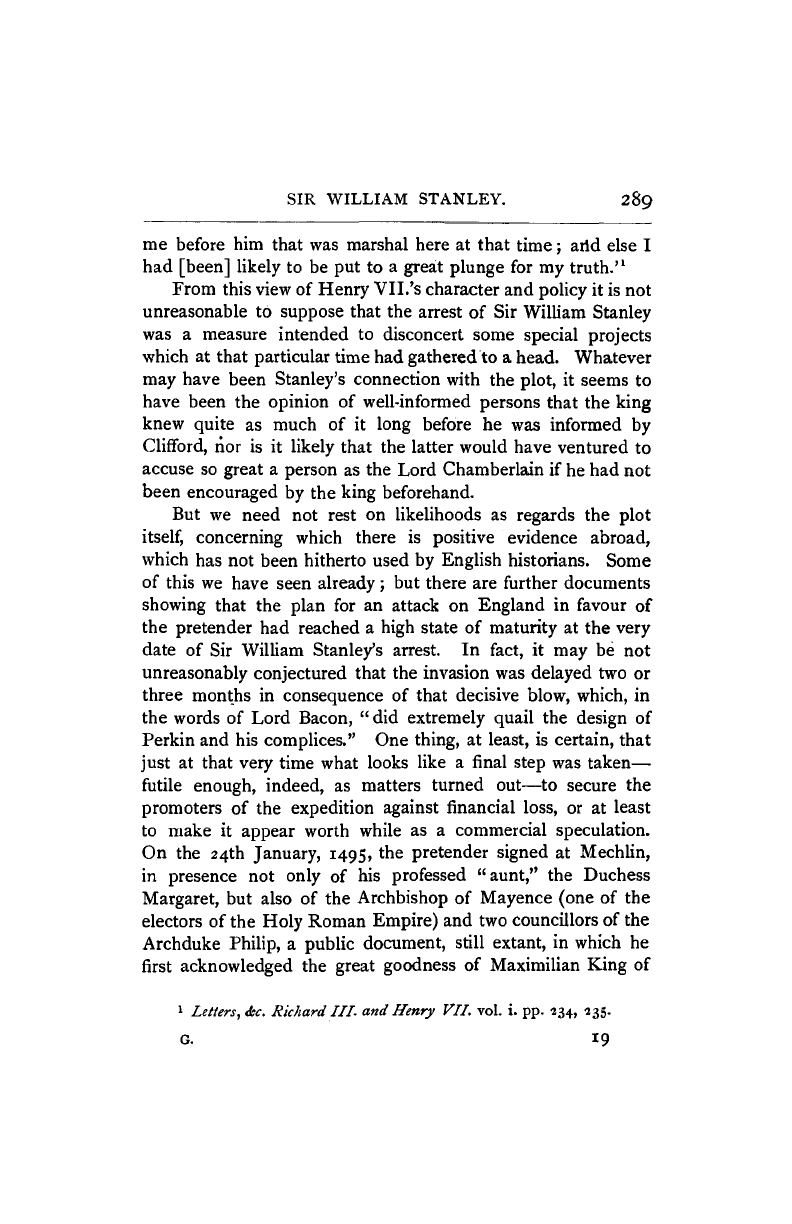
SIR WILLIAM STANLEY. 289
me before him that was marshal here at that time; arid else I
had [been] likely to be put to a great plunge for my truth."
From this view of Henry VII.'s character and policy it is not
unreasonable to suppose that the arrest of Sir William Stanley
was a measure intended to disconcert some special projects
which at that particular time had gathered to a head. Whatever
may have been Stanley's connection with the plot, it seems to
have been the opinion of well-informed persons that the king
knew quite as much of it long before he was informed by
Clifford, nor is it likely that the latter would have ventured to
accuse so great a person as the Lord Chamberlain if he had not
been encouraged by the king beforehand.
But we need not rest on likelihoods as regards the plot
itself,
concerning which there is positive evidence abroad,
which has not been hitherto used by English historians. Some
of this we have seen already; but there are further documents
showing that the plan for an attack on England in favour of
the pretender had reached a high state of maturity at the very
date of Sir William Stanley's arrest. In fact, it may be not
unreasonably conjectured that the invasion was delayed two or
three months in consequence of that decisive blow, which, in
the words of Lord Bacon, " did extremely quail the design of
Perkin and his complices." One thing, at least, is certain, that
just at that very time what looks like a final step was taken—
futile enough, indeed, as matters turned out—to secure the
promoters of the expedition against financial loss, or at least
to make it appear worth while as a commercial speculation.
On the 24th January, 1495, the pretender signed at Mechlin,
in presence not only of his professed "aunt," the Duchess
Margaret, but also of the Archbishop of Mayence (one of the
electors of the Holy Roman Empire) and two councillors of the
Archduke Philip, a public document, still extant, in which he
first acknowledged the great goodness of Maximilian King of
1
Letters,
isc.
Richard
III.
and Henry
VII. vol. i. pp. 234, 235.
G. 19
